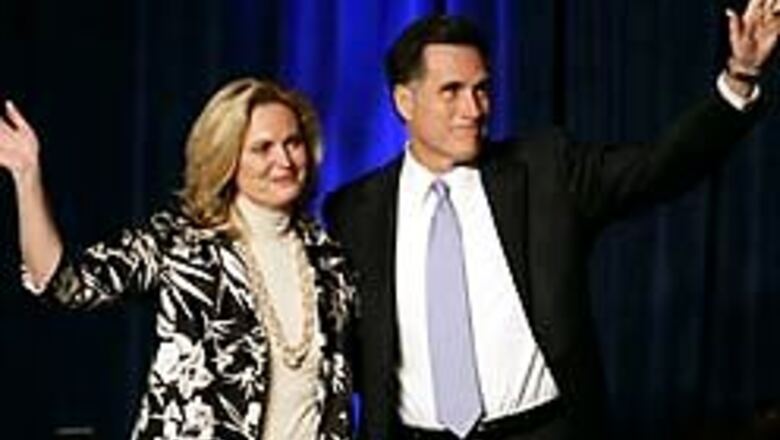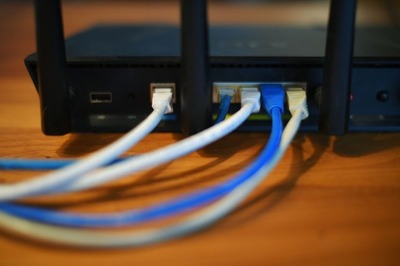
views
Washington: John McCain effectively sealed the Republican presidential nomination on Thursday as chief rival Mitt Romney suspended his faltering presidential campaign. "I must now stand aside, for our party and our country," Romney told conservatives.
"If I fight on in my campaign, all the way to the convention, I would forestall the launch of a national campaign and make it more likely that Senator Clinton or Obama would win. And in this time of war, I simply cannot let my campaign, be a part of aiding a surrender to terror," Romney told the Conservative Political Action Conference in Washington.
Romney's decision leaves McCain as the top man standing in the Republican race, with Mike Huckabee and Ron Paul far behind in the delegate hunt.
It was a remarkable turnaround for McCain, who some seven months ago was barely viable, out of cash and losing staff.
The four-term Arizona senator, denied his party's nomination in 2000, was poised to succeed George W Bush as the Republican standard-bearer.
Romney launched his campaign almost a year ago in his native Michigan.
The former Massachusetts governor and venture capitalist invested more than $40 million of his own money into the race, counted on early wins in Iowa and New Hampshire that never materialised and won just seven states out of 21 on the Super Tuesday vote.
He insisted on Wednesday that only a conservative cultural and economic path would keep the United States a superpower and help it avoid becoming a "demographic disaster," like Europe.
"That's the inevitable product of weakened faith in the Creator, failed families, disrespect for the sanctity of human life, and eroded morality," he said.
"I'm convinced that unless America changes course, we could become the France of the 21st century," he said.
"Still a great nation, but not the leader of the world, not the superpower. And to me that's unthinkable."
Romney again hammered the economic theme, a subject that helped bring him early campaign wins from voters concerned that the country is in a recession.
"If we don't change course, Asia or China will pass us by as the economic superpower, just as we passed England and France during the last century."
PAGE_BREAK
Overall, McCain was leading the race with 707 delegates, to 294 for Romney and 195 for Huckabee.
It takes 1,191 to win the nomination at this summer's Republican convention in St Paul, Minnesota.
"I disagree with Senator McCain on a number of issues, as you know. But I agree with him on doing whatever it takes to be successful in Iraq, on finding and executing Osama bin Laden, and on eliminating al-Qaida and terror," Romney said.
The Huckabee campaign said the former Arkansas governor would push on.
"We're still in the race and we're still competing for delegates, and today demonstrates how long and windy to the White House this is," said Chip Saltsman, Huckabee's campaign manager.
Romney's departure from the race came almost a year after his formal entrance, when the Michigan native declared his candidacy on February 12, 2007, at the Henry Ford Museum of Innovation in Dearborn, Michigan.
Over the ensuing 12 months, Romney sought the support of conservatives with a family values campaign, emphasising his opposition to abortion and gay marriage, as well as his support for tax cuts and health insurance that would benefit middle-class families.
But he was dogged by charges of flip-flopping, a criticism that undermined the candidacy of another Massachusetts hopeful - Democratic John Kerry in 2004.
In seeking to unseat liberal Senator Edward M Kennedy in 1994 in Massachusetts, Romney said he would be a better advocate for gay rights than his rival and he favored abortion rights.
Throughout his campaign, Romney was questioned by voters and the media about his Mormon faith.
Hoping assuage voters skeptical of electing a Mormon president, Romney gave a speech on December 6 in College Station, Texas, that explicitly recalled remarks former President John F Kennedy made in 1960 in an effort to quell anti-Catholic bias.
He vowed to serve the interests of the nation, not the church, if elected president.
In early voting Iowa, Romney sought votes by casting himself as the guardian of the Reagan-era conservative triad - a three-legged stool, as the candidate put it - of a strong national defence, strong economy and strong families.
PAGE_BREAK
Fueled by what would grow to more than $35 million of personal donations, his campaign hired top-notch staff in the early voting states, and Romney scored an early win when his organisation topped the field at the Iowa Straw Poll in August.
By that time, the national front-runners, McCain and former New York Mayor Rudy Giuliani, had virtually ceded the lead-voting state to Romney.
Instead, McCain focused on New Hampshire, second on the calendar, while Giuliani employed an untested strategy of waiting out the early primary contests and instead staking his candidacy on a strong showing in the January 29 Florida primary.
Romney's goal was to score back-to-back wins in Iowa and New Hampshire, clearing the field and creating momentum to roll through Florida - where he enjoyed the support of top aides to former Governor Jeb Bush - and seal the nomination in the Super Tuesday contests.
Instead, Romney was beaten January 3 in Iowa by former Arkansas Governor Mike Huckabee, a former Southern Baptist minister who received an unexpected outpouring of support in the caucuses from voters identifying themselves as evangelicals.
Five days later, Romney suffered a second consecutive defeat in New Hampshire, when McCain won the primary in part with the support of independents attracted to his self-styled maverick campaign.
Romney and McCain went head-to-head in the January 13 Michigan primary, and Romney won, in part by highlighting his background as a business consultant and venture capitalist.
When McCain acknowledged what seemed to be obvious, that not all of Detroit's lost auto industry jobs would be recovered, Romney pounced.
He accused the senator of pessimism, outlining a $20 billion industry recovery package and telling audiences in economically ailing Michigan, "I will fight for every single job."
Romney also tweaked his stump speech to criticise McCain for stating that he was more familiar with foreign affairs and military matters than economic issues.
Highlighting his 25-year business career, he told audiences, "Senator McCain says the economy is not his strong suit; well, it is my strong suit."
As the calendar progressed, however, McCain picked up a big-ticket win in the January 19 South Carolina primary. Romney instead focused on his victory in the Nevada caucuses the same day.
Ten days later, the two squared off again in the Florida primary, where McCain scored a major upset after winning endorsements from the state's two top elected Republicans - Governor Charlie Crist, a popular figure who had previously said he planned to remain neutral in the race, and Senator Mel Martinez.
The following day, Giuliani dropped out of the race and endorsed McCain.
A day later, popular California Governor Arnold Schwarzeneger announced his endorsement of McCain, reflecting a coalescing of Republican support behind the senator as he approached a Super Tuesday showdown with Romney.
Romney's final pitch was to label McCain a liberal like Hillary Clinton and Obama, a charge tantamount to heresy in the Republican Party.



















Comments
0 comment